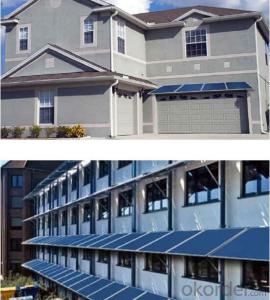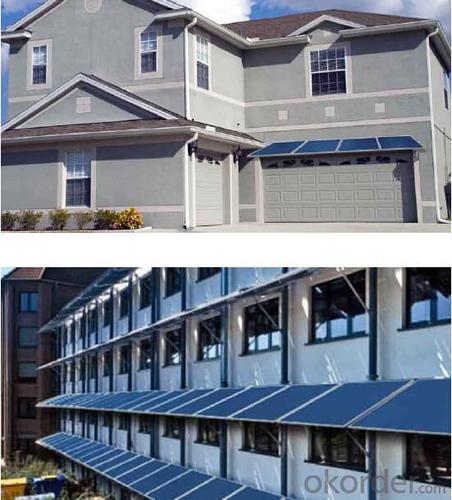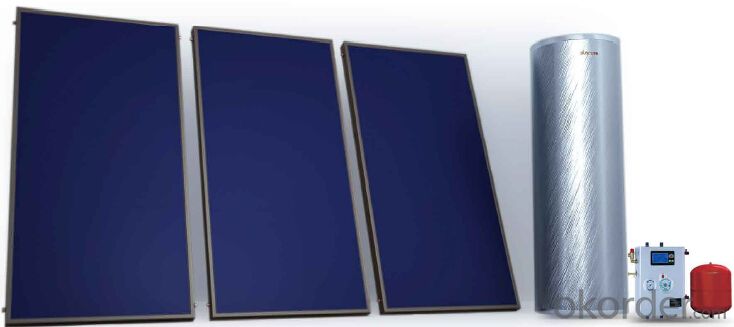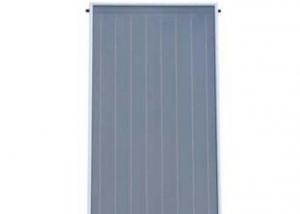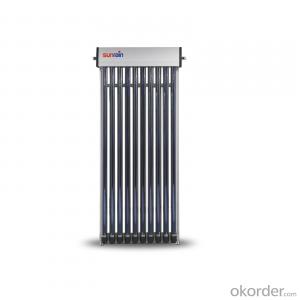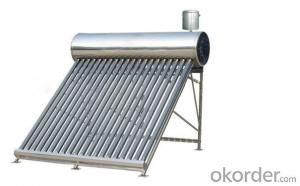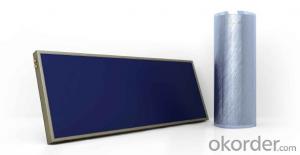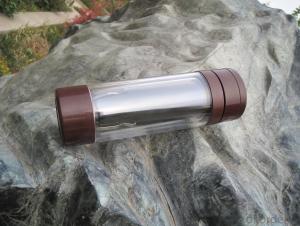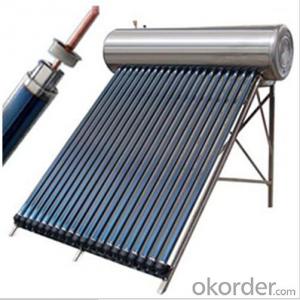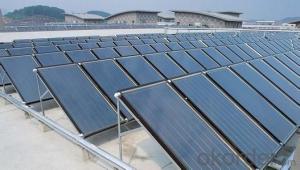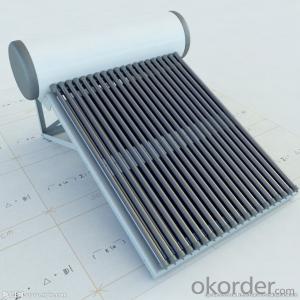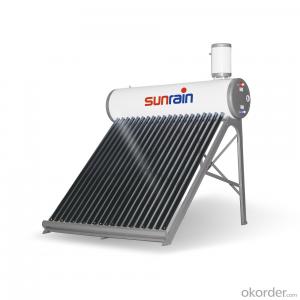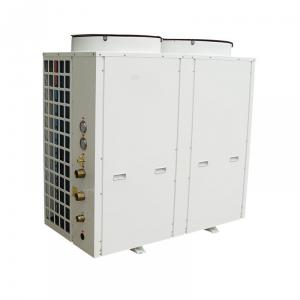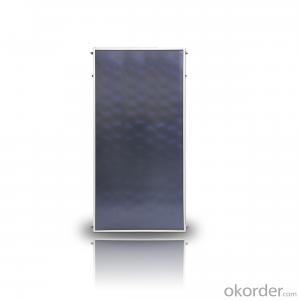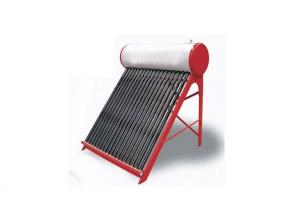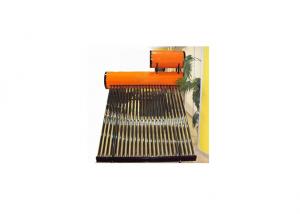200 Liter Split Solar Water Heating System (Luxury)
- Loading Port:
- Tianjin
- Payment Terms:
- TT OR LC
- Min Order Qty:
- 1 set
- Supply Capability:
- 50 set/month
OKorder Service Pledge
OKorder Financial Service
You Might Also Like
1. Structure of Split Solar Water Heating System
Our Split Solar Water Heating System has two versions: standard and luxury. Compared to compact type solar water heating system, split solar water heating system can offer enough water for need and manage to supply hot water to divers spots like in kitchen, bathroom and so on. Then split solar water heating system can be installed in the balcony, on the wall or rooftop, which can avoid the difficulty of installation on high building. In comparison to the standard version, luxury version is equipped with larger water tank and more solar collector to increase efficiency ratio.
Split solar water heating system is a kind of synthetical energy saving system, suitable for different kinds of architectural style, and as a technology indenpendent to urban energy saving requirment, it is ideal supporting facilities for real estate developpment. Morever, we have obtained produts certificate as follows:

2. Main Features of Split Solar Water Heating System
larger wter tank
adopt multiple modularized insulation technoloty
more suitable for BIPV
split water compression system and induced force circulations to increase heat exchange rate
3. Split Solar Water Heating System Images
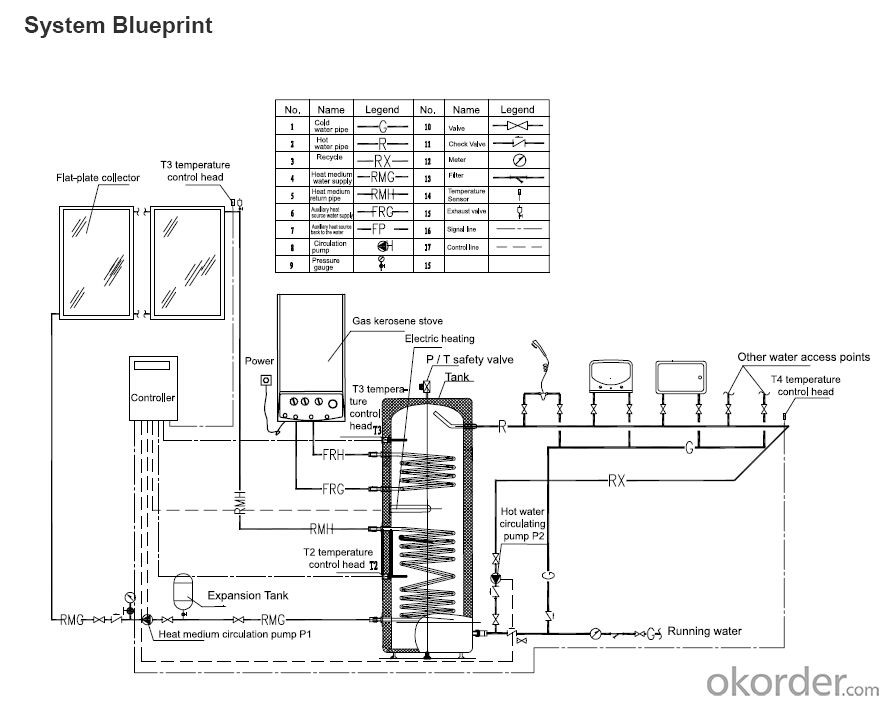
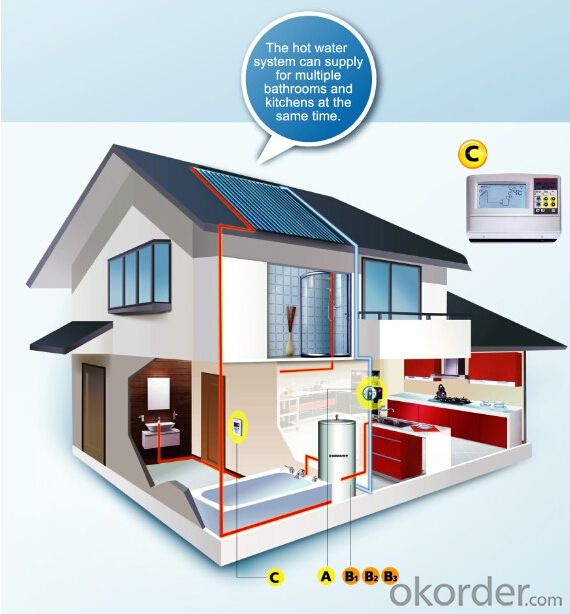
4. Split Solar Water Heating System (Standard) Specification
| Model | Volume(L) | Tank Dimension(mm) | Solar Collector Model | Collecting Area (m2) | Gadget |
| PJF-2-340-3 | 340 | φ620×1699 | P-G/0.6-L/LT-1.8-301 | 6 | pressure expansion tank, controller, water pump |
| PJF-2-450-3 | 450 | φ720×1920 | P-G/0.6-L/LT-1.8-301 | 8 | pressure expansion tank, controller, water pump |
5. FAQ
(1) Do you have operation and installation manual for guide?
Yes, we have booklet with the products in the package. If you still have problems, you can email us for help.
(2)Can the prducts be modified?
Yes, the products can be modified according to specific requirement , and we would like to suggest you contacting with our technicist for more details.
(3) How long can the customer get the goods?
Honestly speaking, it depends on the quantity of your order, the way of delivery and other factors that concerns about it. But if your purchase for a large amount, it is possible to give the customer some discount in price.
- Q: Classification of solar water heaters
- 3 ceramic hollow flat plate solar water heaterCeramic solar panels are a common ceramic matrix, three-dimensional mesh surface layer of V-Ti black ceramics hollow thin-walled flat box type solar collector. Ceramic solar panels for the whole ceramic material, waterproof, impermeable, high strength, good rigidity, no corrosion, not aging, do not fade, non-toxic, harmless, non radioactive, sunlight absorption rate does not decay, with long-term high photothermal conversion efficiency. By the national solar water heater quality supervision and inspection center detection, the solar absorption ratio of ceramic solar panels is 0.95, the solar energy of the solar energy roof of concrete structure is 8.6MJ, much higher than the national standard. Ceramic solar panel manufacturing, low cost, light absorption ratio does not decay, with life and architecture, can be used for concrete structure and the roof structure shared ceramic layer and the insulating layer, waterproof layer, simple structure, good insulation effect on the original roof, and building integrated solar roof, wall, balcony guardrail surface Xiangyang provide hot water, heating, air conditioning, building; provide heat energy for agriculture and aquaculture; can be used for large-scale desert solar hot water power generation, wind power generation, desalination, brackish water desalination, turn the desert into farmland.
- Q: Can a solar water heater be used in areas with extreme temperature fluctuations?
- Solar water heaters are versatile enough to be used in regions with drastic temperature changes. Their design allows them to endure a wide range of temperatures, making them suitable for both extremely hot and cold environments. The key to their effectiveness lies in their well-thought-out design and insulation. To combat freezing temperatures, solar water heaters in cold areas may employ freeze protection mechanisms like antifreeze heat transfer fluids or heat exchangers. These mechanisms ensure that the water or heat transfer fluid does not freeze, allowing the system to operate efficiently. Similarly, in areas with scorching heat, solar water heaters can be equipped with efficient insulation to minimize heat loss. Furthermore, the positioning of the solar collectors can be adjusted to maximize heat absorption in colder climates or reduce it in hotter climates. With careful consideration given to design and insulation, solar water heaters can be effectively used in regions with extreme temperature fluctuations.
- Q: What is the maintenance cost for a solar water heater?
- The maintenance cost for a solar water heater is generally minimal. Routine maintenance, such as cleaning the panels and checking for any leaks or damage, can be done by the homeowner and does not require professional assistance. However, it is recommended to have the system inspected by a professional every few years to ensure optimal performance. Overall, the maintenance cost for a solar water heater is significantly lower compared to traditional water heaters, as there are no fuel costs involved.
- Q: Can a solar water heater be used in areas with high salinity water?
- Yes, a solar water heater can be used in areas with high salinity water. However, it is important to consider the potential impact of high salinity on the system's components such as pipes and collectors. Regular maintenance and proper cleaning of the system may be required to prevent salt build-up and corrosion. Additionally, using materials specifically designed for high salinity environments can help mitigate any potential issues.
- Q: Can a solar water heater be used in areas with limited access to government support or incentives for renewable energy?
- Yes, a solar water heater can be used in areas with limited access to government support or incentives for renewable energy. Solar water heaters are a cost-effective and sustainable alternative to traditional water heating methods, regardless of government support. They utilize the energy from the sun to heat water, reducing reliance on fossil fuels and lowering energy bills. In areas without government incentives, the initial cost of purchasing and installing a solar water heater may be higher. However, the long-term benefits outweigh this initial investment. Solar water heaters have a relatively low maintenance cost, require minimal repairs, and have a lifespan of 20 to 30 years, providing significant savings over time. Furthermore, solar water heaters do not rely on a constant supply of electricity, making them suitable for areas with limited access to power or unreliable grid systems. This makes them particularly useful in rural or remote areas where government support may be scarce. Additionally, solar water heaters can be easily integrated into existing water heating systems, reducing the need for extensive modifications or infrastructure updates. This adaptability makes them suitable for a wide range of environments, even those with limited resources or government support. In conclusion, while government support or incentives for renewable energy can make the adoption of solar water heaters more financially attractive, they are still a viable and beneficial option in areas with limited access to such support. The long-term cost savings, environmental benefits, and adaptability of solar water heaters make them a sustainable choice for water heating, regardless of government incentives.
- Q: How does a solar water heater perform during winter months?
- A solar water heater can still perform well during winter months, although its efficiency may be slightly reduced due to shorter daylight hours and less direct sunlight. However, with proper insulation and design, it can still generate enough heat to provide hot water. Additionally, some systems are equipped with backup heating elements to ensure a continuous supply of hot water during colder periods.
- Q: How does the temperature of the water affect the performance of a solar water heater?
- The temperature of the water directly affects the performance of a solar water heater. Higher water temperatures result in increased efficiency and faster heating times, allowing the system to produce more hot water. Conversely, colder water temperatures can decrease efficiency and prolong the heating process. Therefore, the temperature of the water plays a crucial role in determining the overall performance and effectiveness of a solar water heater.
- Q: How does the flow rate of the water affect the performance of a solar water heater?
- The flow rate of the water directly affects the performance of a solar water heater. A higher flow rate allows for more water to be heated, resulting in increased hot water availability. However, a very high flow rate can reduce the amount of time the water spends in contact with the solar collector, leading to lower heating efficiency. It is important to find a balance between flow rate and heating efficiency to optimize the performance of a solar water heater.
- Q: How does the type of heat exchanger impact the performance of a solar water heater?
- The type of heat exchanger used in a solar water heater can significantly impact its performance. Different types of heat exchangers, such as flat plate, evacuated tube, or heat pipe, have varying efficiencies in transferring heat from the solar collector to the water in the storage tank. Factors like heat transfer efficiency, surface area, and fluid flow pattern influence the overall performance of the solar water heater. Therefore, choosing the appropriate type of heat exchanger is crucial to optimizing the system's efficiency and maximizing the amount of hot water produced.
- Q: How much money can I save with a solar water heater?
- The amount of money you can save with a solar water heater depends on factors such as your current water heating costs, the size and efficiency of the system, and your geographic location. On average, solar water heaters can save homeowners between 50% to 80% on their water heating bills. It's recommended to consult with a solar professional to assess your specific situation and provide an accurate estimate of potential savings.
Send your message to us
200 Liter Split Solar Water Heating System (Luxury)
- Loading Port:
- Tianjin
- Payment Terms:
- TT OR LC
- Min Order Qty:
- 1 set
- Supply Capability:
- 50 set/month
OKorder Service Pledge
OKorder Financial Service
Similar products
Hot products
Hot Searches
Related keywords
